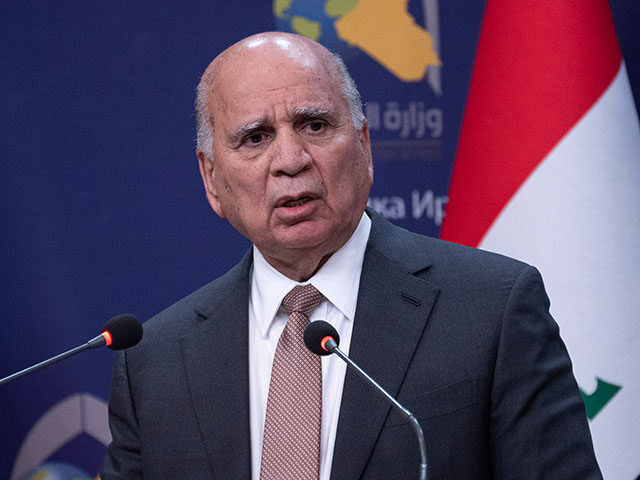Iran Ropes Iraq into Rekindled Syrian Civil War
 AP Photo/Hadi Mizban
AP Photo/Hadi Mizban
The foreign minister of Iran traveled to Baghdad on Friday for a meeting to discuss, alongside his Iraqi and Syrian counterparts, how to address the surging campaign by Sunni jihadists to overthrow Syrian dictator Bashar al-Assad.
Iranian Foreign Minister Abbas Araqchi emphasized on the visit, according to Iranian state media outlets, that the developments in Syria are of great interest to Iraq and could cause a spillover of militia violence in the country. An Iraqi government spokesman, Basim al-Awadi, told the Kurdish outlet Rudaw on Friday that, despite the apparent pressure from Iran, Assad had not requested Iraq send military backup to help him fight the rebel militias in his country and Baghdad does not intent to “make a military intervention in Syria.”
Syria has been in a state of civil war since 2011 that fell largely dormant after the collapse of the Islamic State in 2017 and Assad’s successful campaign against Sunni rebel groups. Last week, however, that status changed dramatically as fighter associated with Hayat Tahrir al-Sham (HTS), a Sunni jihadist militia formerly known as the Nusra Front with ties to al-Qaeda, captured Aleppo, Syria’s second-largest city. HTS followed that campaign up with what appears to be the successful conquest of another city, Hama, on Thursday, and reports that their jihadis are marching towards Homs following that victory.
Shortly after the Aleppo offensive began, the Syrian National Army (SNA), a Sunni militia formerly known as the Free Syrian Army that now largely operates as a Turkish proxy group, began attacking Syrian Kurdish communities in greater Aleppo province. The Turkish government considers the Kurdish-led Syrian Democratic Forces (SDF), a militia that was instrumental in helping the United States liberate Raqqa, its caliphate “capital,” from the Islamic State, a terrorist organization, and is actively cheering on both the collapse of the Assad regime and attacks on Kurdish communities.
Iran and its Shiite proxies – as well as notably, the Assad regime – has remained notably silent on the fight between the SNA and the Kurds. In Baghdad on Friday, Araqchi instead repeated Iran’s unsubstantiated claim that Israel and America are somehow behind the HTS offensive and demanded more global involvement in defending Assad.
“Iran has always supported the Syrian government and people in their fight against terrorist groups and will continue to do so with all its might and with whatever is needed and requested by the Syrian government,” Araqchi proclaimed, according to the Iranian outlet Tasnim News. He specifically named Iraq, Jordan, and Turkey as the countries most likely to be affected by a new wave of terrorism should the Assad regime fall.
“In order to protect our own security, we must support the security of our neighbors in the fight against terrorism,” he demanded, emphasizing that “the role of the Zionists [Israel] in designing this conspiracy should not be overlooked.” As usual, he offered not specific claims or evidence tying Israel to any of the events unfolding in Syria.
Araqchi also stated that Iran is prepared to send its official military into Syria if necessary to defend Assad. Iran already has several Shiite jihadist proxy entities, most prominently Hezbollah, active in the Syrian war theater.
The Iraqi government has expressed concern for the situation in Syria, and especially that it may further destabilize the already fragile and fragmented state of Iraq. Unlike Iran, however, Baghdad pushed back on the idea of sending its military into Syria on Friday.
“So far, the Syrian government has not requested military support from us, but they informed us that their country is in a bad situation and warned about the challenges ahead,” Basim al-Awadi, a government spokesman, told Rudaw. “We will not make a military intervention in Syria.”
Awadi did note that Iraq had deployed “support forces.” Reports this week indicated that hundreds of troops affiliated with the Popular Mobilization Forces (PMF), an Iran-backed coalition of militias in Iraq that have been formally incorporated into the Iraqi military, have crossed into Syria to aid Assad forces.
Rudaw also reported that separate PMF forces and parts of the Iraqi army had moved closer to the Syrian border in anticipation of any potential expansion of hostilities across the Syrian border.
While Iran has been enthusiastically supporting Assad, the Islamist government of Turkish President Recep Tayyip Erdogan has done little to hide its support of the SNA, which has not directly attacked Assad but targeted Kurdish forces. Erdogan did also appear to extend words of support to HTS on Friday, however, speaking to reporters.
“Idlib, Hama, Homs, and the target, of course, is Damascus. The opposition’s march continues. Our wish is that this march in Syria continues without accidents,” Erdogan said, according to the Turkish state-run Anadolu Agency.
He added that his government “made a call to (Bashar al) Assad. We said: ‘Come, let’s determine the future of Syria together.’ Unfortunately, we did not receive a positive response to this.”
Follow Frances Martel on Facebook and Twitter.
Source link

